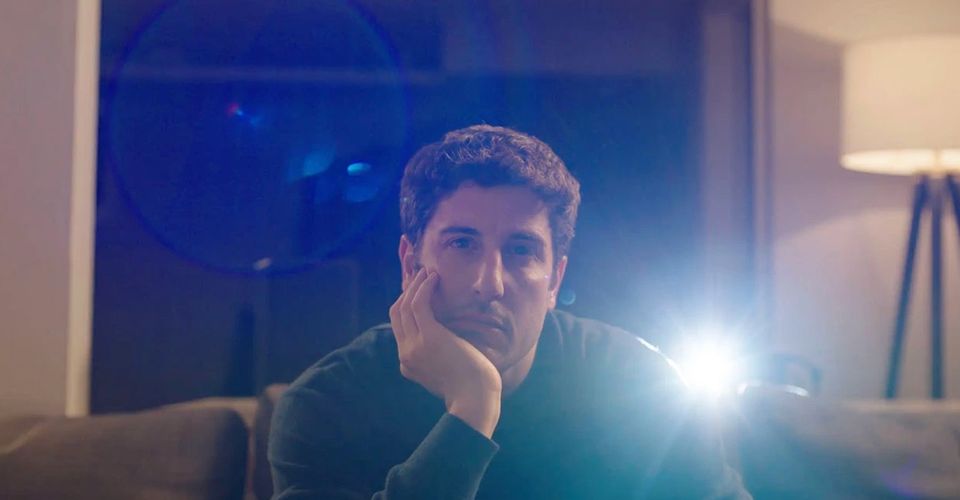The Subject Review: Jason Biggs’ Thriller Suffers From An Identity Crisis

Full of promise but ultimately disappointing, The Subject deals with a topic that is both urgent and underserved. The feature film so poorly executes the material that one leaves the movie frustrated, feeling that what should have been an important moment for 2021 is instead a wasted opportunity. The Subject highlights the toxic, objectifying lens of a white documentary filmmaker who exploits — and profits from — the tragic death of a young Black man; however, in telling its story, The Subject is unable to avoid the same trappings, reducing its BIPOC characters to thin archetypes who service the white, male protagonist’s story.
Hotshot documentary maker Phil Waterhouse (Jason Biggs) is the central character in The Subject. Phil is riding high from the commercial and critical success of his latest film, The Price of Brotherhood; however, the death of the documentary’s subject, Malcolm, haunts Phil, who worries that he should have done more to prevent the teen’s tragic passing — or more accurately, fears that the public will think he should have done more. Malcolm (Nile Bullock) mainly appears in the documentary footage Phil obsessively watches, framed as an almost masochistic impulse on the part of the filmmaker. Clearly, the teen’s death still weighs heavy on Phil’s conscience — and by the end of the movie, it’s obvious why.

The Subject was directed by Lanie Zipoy and written by Chisa Hutchinson. Zipoy makes some strong choices in the movie and balances the often melodramatic scenes well. Easily the highlight of the film is a scene part-way through in which Malcolm and Phil’s roles are switched, with Phil appearing via the documentary footage and Malcolm behind the camera. It’s a brilliant move that elevates the story, driving home the themes of power and objectification; Phil is physically uncomfortable underneath the “gaze” he so readily places others under, which raises questions of agency, consent, and personal responsibility. The themes are genuinely interesting, smart, and fresh, but Zipoy is limited by various inescapable problems with the script and story.
Broadly, The Subject is a commentary on the objectification of urban poverty and Black street culture. As an able-bodied, straight, white male from an affluent family, Phil is a tourist in Harlem, soaking in its “otherness” with the sort of detached confidence that hints at both his privilege and his deep-rooted ignorance. Phil’s naivete at times is almost childlike, bumbling over events, barely cognizant of his own, foolish demeanor. His girlfriend Jess (Anabelle Acosta) accuses him of essentially deluding himself, rewriting his reality so that he is always in the right, always the victim; Phil denies this of course, but it’s obvious to the audience that it’s true. The problem is that none of the characters who interact with Phil react to his behavior with appropriate outrage, anger, frustration, or even annoyance, rendering the film’s action as unbelievable and inauthentic, all of which undercuts the main message of the story.

From a purely narrative perspective, The Subject has significant structural issues. Most — but weirdly not all — of the movie is focalized around Phil’s perspective, showing what he sees, knows, and experiences. Randomly in the first act, audiences are given a full scene without him focusing on his girlfriend, showing a snippet of her life and introducing several characters who never appear — or are even really mentioned — again. The movie spends far too much time building up to its twists, most of which are spoiled by the trailer, and the payoffs lack any sort of emotional relevance. Events happen that have almost no bearing on the main plot, and the movie ends without really resolving anything, fizzling out without adequately confronting Phil’s transgressions or even demonstrating that he’s grown or learned anything. Leslie Barnes (Aunjanue Ellis), Malcolm’s mother, at least gets to call Phil out for his role in her son’s death, but even that feels hollow. Ellis’ performance is strong and even Biggs’ acting in their scene is admirable. But the acting is restricted by underdeveloped writing.
The female characters in The Subject are misused. As a character, Jess is interesting (and she’s easily the most likable character in the entire movie), but Acosta’s onscreen chemistry with Biggs is off-putting. The two share an almost sibling-like rapport that makes their one love scene awkward and hard to watch. Marley (Carra Patterson), an obsessed fan who Phil — against all logic — hires to be his publicist, is equally problematic in The Subject. Phil does her wrong too, but her behavior is so strange, creepy, and borderline sociopathic that it’s impossible to feel sorry for her.

Several of the characters’ choices in The Subject can only really be described as bafflingly stupid. Phil, seemingly the day after catching a stalker filming him, interviews a potential publicist without doing the bare minimum of background checking her first (evinced by his surprise that Marley was a “girl” — did he think public relations was a male-dominated profession?), then invites her into his home to make him dinner, a move that is not only incredibly unprofessional but also disrespectful to his girlfriend who also lives there. Later, when Jess is understandably upset with him, he tries to smooth things over by arguing that he introduced her as his girlfriend so that his new publicist wouldn’t mistake Jess as his “housekeeper.” It’s a deeply racist (Jess is Latinx) and insulting excuse that largely gets glossed over.
The Subject doesn’t know what to do with Phil; he’s clearly a terrible person, but the film shies away from framing him as an anti-hero or villain. The character’s personality is gestured at, but mainly he’s a generally inoffensive, seemingly affable filmmaker who harbors racial and gender prejudices. He is broadly a pathetic, selfish human being who wields pity like a shield, protecting him from culpability. The thriller framework fails because its focus, Phil, is so repugnant. It’s hard to build suspense around a character who audiences want to see actively harmed; yet, the inherent social commentary also fails because it’s undermined by the psychological thriller elements. The drama is centered on Phil’s experience, but as neither a hero nor a villain, his story is uninteresting. Ultimately, The Subject suffers from an identity crisis.
The Subject was released in theatres and on TVOD on October 22, 2021. It is 119 minutes long and is unrated.
About The Author


















